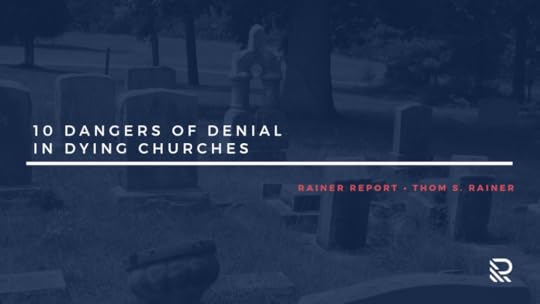Thom S. Rainer's Blog, page 130
February 20, 2019
10 Dangers of Denial in Dying Churches

10 Dangers of Denial in Dying Churches
The problems will only worsen.
Future generations are forsaken.
Leaders will have regrets.
Churches will miss opportunities for solutions.
There is no urgency for change.
Maintenance ministries engender frustration and conflict.
Churches in denial are usually disobedient.
Many of these churches will tolerate open and flagrant sin.
The church will lose its best members.
Comfort becomes an idol.
Some highlights from today’s Rainer Report:
If you don’t deal with the present, you won’t be a force for the future.
The way to move forward in a church is to be proactive, not reactive.
Successful change requires you to admit something is wrong and needs to be addressed.
A church in denial of dying is often disobedient to the Great Commission because they don’t see the need for living it out.
February 19, 2019
Five Micro-Strategies for Growing Your Church – Rainer on Leadership #512

Podcast Episode #512
SUBSCRIBE:
iTunes • RSS • Stitcher • TuneIn Radio • Google Play • iHeart Radio • Spotify
Growth in a church doesn’t have to be the result of a large strategy. Today we discuss how a few small things can lead to big growth.
Some highlights from today’s episode include:
Many pastors and church leaders try to start too much in their church.
Too many local community ministries don’t have a clear outreach component that connects people to a church service.
Outreach to local adults with special needs is a great opportunity for a church to serve its community.
Small increases in a church can lead to big momentum for growth.
The five micro-strategies we discuss are:
Get a commitment from one or two groups.
Start a ministry from scratch with a clear outreach component to it.
Find a group in your community that may be neglected in ministry.
Make Pray and Go an ongoing ministry of your church.
Try a few of the 16 adjustments.
Resources mentioned in today’s podcast
Church Answers
RevitalizeBundle.com
16 Quick Adjustments
Pray and Go
Rainer on Leadership is a member of the LifeWay Leadership Podcast Network
Episode Sponsors
 Vanderbloemen Search Group is the premier pastor search firm dedicated to helping churches and ministries build great teams. They’ve helped thousands of churches just like yours find their church staff and are uniquely geared to help you discern who God is calling to lead your church.
Vanderbloemen Search Group is the premier pastor search firm dedicated to helping churches and ministries build great teams. They’ve helped thousands of churches just like yours find their church staff and are uniquely geared to help you discern who God is calling to lead your church.
For more information, visit WeStaffTheChurch.com.
 Today’s episode is sponsored by Midwestern Baptist Theological Seminary. Be sure to check out Midwestern’s Doctorate of Ministry Degree. The D.Min. is an advanced degree preparing students for leadership in local churches and denominational service. It is also fully attainable in hybrid format which means you don’t have to move to pursue the degree.
Today’s episode is sponsored by Midwestern Baptist Theological Seminary. Be sure to check out Midwestern’s Doctorate of Ministry Degree. The D.Min. is an advanced degree preparing students for leadership in local churches and denominational service. It is also fully attainable in hybrid format which means you don’t have to move to pursue the degree.
Find out more at mbts.edu/dmin.
Feedback
If you have a question you would like answered on the show, fill out the form on the podcast page here at ThomRainer.com. If we use your question, you’ll receive a free copy of Scrappy Church.
February 18, 2019
Five Reasons More Churches Are Moving from Vertical Growth to Horizontal Growth

Two of the most dramatic trends in churches the past decade are declines in attendance frequency and the move to horizontal growth.
I have written and spoken at length about the trend of declining attendance frequency of “committed” church members. But I have not really unpacked why churches are moving toward horizontal growth.
Definitions are in order. Vertical growth refers to an increasing number in the same place or unit. For example, if a church has grown from 150 to 175 in attendance in its 10:30 worship service, it has a vertical growth of 25. The growth takes place in the same service.
Horizontal growth is the term we use to describe numerical growth that takes place by adding units. For example, if the church above decided to start a new worship service at 9:00 am, and total attendance of the 9:00 am and 10:30 am services grew to 225 from 175, we would say the growth of 50 was largely horizontal growth.
So why is growth more likely today with additional services, classes, groups, venues, and campuses? Why do we see the horizontal strategy to be more pervasive today? Here are five key reasons:
Horizontal growth is usually better stewardship. It is typically better to add a second worship service than to build a new worship center from a stewardship perspective. The church can accommodate more people without more capital expenses and debt.
Horizontal growth can offer more choices to reach different demographics. As an example, a Tuesday night worship service may reach those people who have to work on Sunday mornings. Churches can often reach a wider demographic with more options.
Horizontal growth reaches Gen X and the Millennials who typically prefer smaller gatherings. They like the resources of larger churches, but they also prefer the smaller gatherings of smaller churches. A larger church can get smaller through additional services, venues, and sites.
Horizontal growth can reach a new community without abandoning the church’s current community. Such is the advantage of an additional site or campus in another part of the community. One church, for example, is located in the suburbs, but had a heart to reach the urban core in the metropolitan area. It leased an old warehouse and started reaching a large slice of the unchurched urban population.
Horizontal growth often has many of the advantages of church planting without planting a new church. Many of these examples could be accomplished with a church plant. But starting something brand new without the resources of an existing church is challenging. Horizontal growth can sometimes capture the benefit of both worlds.
Is horizontal growth a prescriptive strategy for churches? I don’t think so. I see it more as a descriptive reality. And I will be watching this trend closely to see if more people are reached with the gospel. Then I will get really excited about it.
February 17, 2019
Pray for Bethel Baptist Church

Location: Oakway, South Carolina
Interim Pastor: Tony Smith
Weekly Worship: 10:00 AM, Eastern
Fast Facts: Bethel Baptist Church is a part of the Oakway, SC, community and hosts an outstanding Vacation Bible School each summer for children through adults. They celebrate the kickoff of Vacation Bible School with a community-wide fireworks, hotdog, and bouncy house event that we also pair as their Independence Day celebration. Please pray for the church leadership team as they get closer to voting on some changes they are looking to make. Their biggest prayer is for the revitalization they are in the midst of. The church has seen significant decline in numbers and is working hard to facilitate change in a traditional church. Please pray for them during these uncertain times that they may have joy and press on toward what God is revealing to them
Website: LovingBethel.
“Pray for . . .” is the Sunday blog series at ThomRainer.com. We encourage you to pray for these churches noted every Sunday. Please feel free to comment that you are praying as well.
If you would like to have your church featured in the “Pray for…” series, fill out this information form..
February 16, 2019
A Few Thoughts about Ordination in the Southern Baptist Convention

The recent articles from the Houston Chronicle about sex abuse in the Southern Baptist Convention (SBC) are convicting to me. What can I and others do better to prevent such abuse? How can we better serve, help, and show compassion to the victims?
I know many of you readers are not a part of the SBC, but please allow me to have this “family” conversation. It is too great of an issue to treat lightly.
One of the issues we have in SBC life is how we license and ordain pastors and staff. Each local church has the authority to ordain and license people because of our belief in the autonomy of the local church. In many cases, because our ordination process is so weak, we “bless” new pastoral candidates who may not be ready for ministry at the least, and who are sexual predators at worst.
Here are some of my thoughts on how we ordain, and how we could do so differently, particularly to protect our churches from predators and others who are not fit for vocational ministry.
Autonomy is not an excuse for irresponsibility. Every local church that licenses and ordains has a heavy and sobering responsibility. We need to examine our processes and how we communicate those processes to the full congregation. No church should vote on a candidate until they are confident the candidate has been vetted in every way possible.
Background checks should become normative in the ordination process. Some of you may be shocked to learn we likely have more churches doing background checks on church volunteers than we do ordination candidates. And let me confess my own neglect. I have sat on many ordination councils, and I have never asked to see a background check of the candidate. In fact, I doubt a background check was done, because it was not mentioned. Shame on me.
We should not assume the ordination of a pastor or staff member from another church is sufficient for our church. When churches call a pastor or pastoral staff member, that person should be examined as if a new ordination is taking place. Unfortunately, we cannot always have confidence that the ordaining church did its homework.
Leaders should insist on vigorous examinations of candidates for ordination. Our polity does indeed advocate local church autonomy, as I note above. But our structure should not be an impediment for good practices. The influence of leaders is often more powerful than the rules of a structure. Leaders, like me, should speak up more clearly and more quickly.
Solving the ordination problem alone will not solve the sexual abuse problem. But it’s a start. Many predators in the pulpits and on church staff got there because we did not ask the right questions nor put them through thorough screening processes.
It’s time to change.
February 15, 2019
The Most Frequent Issues Facing Pastors and Other Church Leaders – Rainer on Leadership #511

Podcast Episode #511
SUBSCRIBE:
iTunes • RSS • Stitcher • TuneIn Radio • Google Play • iHeart Radio • Spotify
We are asked for insights into different areas of church life on a consistent basis. Today, we cover the seven most frequent issues pastors come to us with.
Some highlights from today’s episode include:
When church leaders are looking for a resources they mostly want to know what is best, not just what is available.
You can’t microwave leadership development.
Church revitalization has gone from something that was rarely discussed five years ago; now it is at the forefront of church discussions.
A church will not be outwardly-focused if the pastor is not outwardly-focused.
The seven issues we discuss are:
Where to go for answers and resources
How to deal with business and leadership issues
Dealing with critics
Understanding how to revitalize a church
Knowing how/when to begin at a church or exit a church
Dealing with staff issues
Leading a church to become outwardly focused
Resources mentioned in today’s podcast
Preferred Providers
RevitalizeNetwork.org
Advice to Young Pastors
Five Hour Challenge
Rainer on Leadership is a member of the LifeWay Leadership Podcast Network
Episode Sponsors
 The ministry landscape is changing, and the need for biblical training is more necessary than ever. It’s time to get your Master of Divinity degree. The M.Div —Midwestern Seminary’s flagship degree program — is the primary track for ministry preparation. At just 81 hours, the Midwestern M.Div offers a complete foundation for full-time ministry leaders, offering everything you need, and nothing you don’t. Join other students in vibrant Kansas City as you train in a unique collaborative environment focused on the local church or study online in your current ministry context. Midwestern Seminary is developing a discipleship culture devoted to the local church and committed to God’s unchanging Word. Why not start your training today?
The ministry landscape is changing, and the need for biblical training is more necessary than ever. It’s time to get your Master of Divinity degree. The M.Div —Midwestern Seminary’s flagship degree program — is the primary track for ministry preparation. At just 81 hours, the Midwestern M.Div offers a complete foundation for full-time ministry leaders, offering everything you need, and nothing you don’t. Join other students in vibrant Kansas City as you train in a unique collaborative environment focused on the local church or study online in your current ministry context. Midwestern Seminary is developing a discipleship culture devoted to the local church and committed to God’s unchanging Word. Why not start your training today?
Find out more at mbts.edu/mdiv.
 Vanderbloemen Search Group is the premier pastor search firm dedicated to helping churches and ministries build great teams. They’ve helped thousands of churches just like yours find their church staff and are uniquely geared to help you discern who God is calling to lead your church.
Vanderbloemen Search Group is the premier pastor search firm dedicated to helping churches and ministries build great teams. They’ve helped thousands of churches just like yours find their church staff and are uniquely geared to help you discern who God is calling to lead your church.
For more information, visit WeStaffTheChurch.com.
Feedback
If you have a question you would like answered on the show, fill out the form on the podcast page here at ThomRainer.com. If we use your question, you’ll receive a free copy of Becoming a Welcoming Church.
February 14, 2019
Nine Commitments Needed From Church Members for Revitalization to Happen – Revitalize & Replant #080

SUBSCRIBE TODAY:
iTunes • RSS • Stitcher • TuneIn Radio • Google Play • Spotify
Church members play a role in revitalization. Their attitudes and actions must reflect an openness to reaching others. Today, we discuss nine commitments they must make to see revitalization in a church.
This Week’s Question:
FROM WADE — Podcast #056 grappled with the uniqueness of a calling to revitalizing a church. You offered helpful up-front points to the would-be revitalizing pastor. Would you flip the coin on to the reverse side and build out the attitudes and commitments of a congregation and its leadership that desires revitalization?
Episode Highlights:
One of the greatest joys of corporate worship is leaving our personal preferences at the door and being led together.
If you’re not serving in your church, you’re not really being an active member of your church.
The deeper in love you are with Christ, the more you will want to serve others.
Dying churches anesthetize the pain of dying with busyness and activity.
The nine commitments we cover are:
I will move from “I am” to I will”
I will worship with others
I will grow together with others
I will serve
I will go
I will give generously
I will not be a church dropout
I will avoid the traps of churchianity
I will make a difference
Resources mentioned in this episode include:
ChurchAnswers.com
RevitalizeBundle.com
ChurchReplanters.com
Replanter Assessment
Find more resources at the Revitalize & Replant page at ThomRainer.com

Revitalize & Replant is sponsored by the North American Mission Board and ChurchReplanters.com. More than 10% of churches in North America are at risk of closing and the North American Mission Board is committed to reversing this trend by decreasing the death rate of existing churches while simultaneously increasing the birth rate of new churches. To learn more about what it means to become a replanting pastor or to explore resources for replanting and revitalization in your own church, visit ChurchReplanters.com.
Submit Your Question:
Do you have a question about church revitalization or replanting for us to use on the podcast? Visit the podcast page to submit your question. If we use it on the show, you’ll get a copy of Autopsy of a Deceased Church and Reclaiming Glory.
February 13, 2019
The Pendulum Swing Syndrome When Churches Get a New Pastor: Five Key Questions

The pattern is predictable.
The previous pastor did not visit enough. We need to get a pastor who visits a lot.
The previous pastor was not evangelistic. We need an evangelistic pastor.
The previous pastor did not like to counsel church members. We need a pastor who is good at counseling.
You get the picture.
Too often churches choose new pastors largely based upon the perceived weaknesses of the previous pastor. While the change in pastors may indeed afford the congregation the opportunity to make necessary shifts in ministry priorities, the church should be wise not to overplay this issue.
When churches become players in the pendulum swing game, they are prone to overlook other issues, some of which may be far more important than compensating for a perceived weakness. I have heard numerous church leaders and members bemoan the bad fit of the next pastor simply because they did not ask sufficient questions.
In order to make certain churches do not intentionally subject themselves to the pendulum swing syndrome, I urge them to consider carefully these five questions:
What are the perceived weaknesses of the previous pastor? No pastor is perfect. No pastor can meet all the needs and demands of church members. Let’s get this issue on the table and in the open, so we can be certain we don’t overcompensate.
What are the clear and pressing needs of the congregation right now? This question is different than asking what everyone wants. It is a high-level question seeking to find the critical needs of the church so that the next pastor may be a good fit. The church should move toward this profile rather than a perceived deficit profile.
What are the greatest opportunities in the community? The transition period between pastors is a great opportunity to assess anew the needs and the opportunities of the community. Has there been significant shifts in the demographics of the community that would inform the profile of the prospective new pastor?
How might an interim pastor help the congregation see more clearly? I am a huge proponent of intentional interim pastorates. That is why we began offering certification of them at Interim Pastor University. The interim pastor can offer an objective perspective of the past, present, and future to help the congregation avoid the knee-jerk reactions common with pendulum swing emotions.
What strengths of the former pastor might be needed in the next pastor? The emotional reaction of a congregation is to seek characteristics opposite of the previous pastor, to address perceived deficits. But it is likely the previous pastor had strengths that would be important for the next pastor to have. Don’t always assume the next pastor should be the opposite of the previous.
Too many churches let the pendulum swing too far when seeking their next pastor. Such emotional responses can result in the next pastor just not being the right fit for the church. It happens too often. Then the church finds itself looking for yet another pastor, probably with the pendulum swinging back the other way.
It’s an unfortunate cycle.
Don’t let your church fall prey to the pendulum swing syndrome.
February 12, 2019
Seven Ways to Stay Encouraged in Pastoral Ministry – Rainer on Leadership #510

Podcast Episode #510
SUBSCRIBE:
iTunes • RSS • Stitcher • TuneIn Radio • Google Play • iHeart Radio • Spotify
Ministry can be disheartening at times. Today, we discuss how you can stay encouraged in ministry.
Some highlights from today’s episode include:
Encouragement is often elusive for pastors.
People who encourage you are a gift.
When we think of others before ourselves, we often find encouragement in seeing how God is moving in the lives of others.
The more time you spend around encouraging people the more encouraging you will be.
Get to know other pastors in your area and encourage one another.
The seven encouragement ideas we discuss are:
Practice Acts 6:4
Be an encourager
Stay outwardly focused
Spend time with encouragers
Be a continuous learner
Find a network
Delegate draining tasks
Resources mentioned in today’s podcast
Church Answers
American Icon
Revitalize Network
Rainer on Leadership is a member of the LifeWay Leadership Podcast Network
Episode Sponsors
 Vanderbloemen Search Group is the premier pastor search firm dedicated to helping churches and ministries build great teams. They’ve helped thousands of churches just like yours find their church staff and are uniquely geared to help you discern who God is calling to lead your church.
Vanderbloemen Search Group is the premier pastor search firm dedicated to helping churches and ministries build great teams. They’ve helped thousands of churches just like yours find their church staff and are uniquely geared to help you discern who God is calling to lead your church.
For more information, visit WeStaffTheChurch.com.
 The ministry landscape is changing, and the need for biblical training is more necessary than ever. It’s time to get your Master of Divinity degree. The M.Div —Midwestern Seminary’s flagship degree program — is the primary track for ministry preparation. At just 81 hours, the Midwestern M.Div offers a complete foundation for full-time ministry leaders, offering everything you need, and nothing you don’t. Join other students in vibrant Kansas City as you train in a unique collaborative environment focused on the local church or study online in your current ministry context. Midwestern Seminary is developing a discipleship culture devoted to the local church and committed to God’s unchanging Word. Why not start your training today?
The ministry landscape is changing, and the need for biblical training is more necessary than ever. It’s time to get your Master of Divinity degree. The M.Div —Midwestern Seminary’s flagship degree program — is the primary track for ministry preparation. At just 81 hours, the Midwestern M.Div offers a complete foundation for full-time ministry leaders, offering everything you need, and nothing you don’t. Join other students in vibrant Kansas City as you train in a unique collaborative environment focused on the local church or study online in your current ministry context. Midwestern Seminary is developing a discipleship culture devoted to the local church and committed to God’s unchanging Word. Why not start your training today?
Find out more at mbts.edu/mdiv.
Feedback
If you have a question you would like answered on the show, fill out the form on the podcast page here at ThomRainer.com. If we use your question, you’ll receive a free copy of Scrappy Church.
February 11, 2019
How Not to Compensate Your Pastor

When I converse with church members who have responsibility for overseeing pastoral compensation, I can expect a few typical reactions. First, the members speak in hushed tones, as if the subject of compensation is a forbidden public topic, only to be mentioned in the confines of need-to-know and confidentiality. Second, I will run into one or more misconceptions about pastor’s pay. Third, I often hear from at least one person who has a very unreasonable attitude about the topic.
In that context, I hear six very common negative themes about pastoral compensation. I wish they were not repeated, but they are. See if you have heard any of them. Let’s look at the six ways not to compensate your pastor.
Don’t use “pay” and “package” synonymously. A pastor’s pay is salary plus housing allowance. That’s it. Nothing else. The pay is not health benefits or retirement benefits; those are, obviously, benefits. The pay is not automobile expenses reimbursed. That is an expense reimbursement. Let me give you an example in the secular world. An employee gets a paycheck of $50,000 a year. The same employee gets $4,000 in medical benefits and $3,000 in retirement benefits. And the employee was reimbursed $4,000 for a conference in California. How much does the employee make? $50,000 of course. You don’t add benefits and expenses and call it pay. That’s the total package, but not the paycheck. Articulate your pastor’s pay with that same vernacular.
Don’t keep the pastors pay low to keep him humble. I’ve heard that excuse too many times. It’s a fake spiritual way to justify low compensation. If any of you church members like that approach, try lowering your own compensation for the sake of humility.
Don’t count the spouse’s income as part of the pastor’s income. I did a consultation with a church a few years ago where the pastor’s compensation was lower than two other staff members. I asked the obvious question regarding the strange discrepancy. The chairwoman of the personnel committee told me the pastor’s wife had a good paying job as a nurse, so they did not need to pay the pastor much. I almost choked on my Chick-fil-A sandwich.
Don’t fail to contribute toward retirement for your pastor. Too many pastors have insufficient funds in their later years. Too many churches neglect contributing toward their retirement.
Don’t fail to find sources that have pastor and staff salary data available. There are a number of such studies published annually. You have no excuse not to find the information that will help you compensate your pastor fairly. Here is an annual study by LifeWay for my denomination:
Don’t neglect raises. Inflation may be low, but it’s still present. When you fail to give a raise to your pastors every year, they are actually falling behind in purchasing power. Insist they take an annual raise, even if it’s only cost-of-living increases. And, hopefully, it will be even more.
As a postscript, don’t let the abuses of money by a very few pastors give you a false perspective. More pastors are underpaid rather than overpaid. And most pastors would rather not broach the topic of their compensation. It’s just too uncomfortable for them.
So, please, take the lead and take care of your pastors financially.
That will be one less burden they have to carry.



